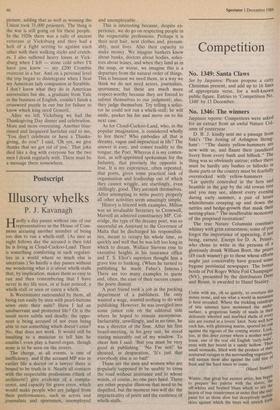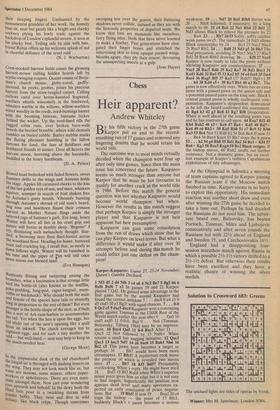No. 1346: The winners
Jaspistos reports: Competitors were asked for an extract from an awful Nature Col- umn of yesteryear.
D. B. J. kindly sent me a passage from Saki's 'The Jesting of Arlington String-
ham': "The dainty yellow-hammers are now with us, and flaunt their jaundiced livery from every bush and hillock." The thing was so obviously untrue; either there must be hardly any bushes or hillocks In those parts or the country must be fearfullY overstocked with yellow-hammers . • • "Lie quietly concealed in the fern and bramble in the gap by the old rowan tree and you may see, almost every evening during early summer, a pair of lesser whitethroats creeping up and down the
nettles and hedge-growth that mask their nesting-place." The insufferable monotony
of the proposed recreation!' The true Nature Columnist combines
whimsy with grim earnestness; some of you forgot the importance of appearing, if not being, earnest. Except for D. A. Prince, who chose to write in the persona of a gloriously drunk William Boot, the prizes (£9 each winner) go to those whose efforts might just conceivably have graced some bygone provincial newspaper. The bonus bottle of Pol Roger White Foil Champagne (NV), presented by the distributors Dent
and Reuss, is awarded to Hazel Stanley.
Come with me, oh so quietly, to overturn this mossy stone, and see what a world in miniature is here revealed. Where the trickling raindrops of late summer have moistened the under' surface, a gregarious family of snails in their delicately whorled and marbled shells of every size are rooted in a lovers' knot. Note well how each has, with glistening mucus, sported his oak against the rigours of the coming winter. Look, too, at this drier corner where a mother wood- louse, one of the real old English 'curly-bobs., rests with her brood in a sandy hollow. Their small stomachs, filled with the produce of their nocturnal ravages in the surrounding vegetation, will sustain them also against the cold bite 0' frost and the hard times to come. (Hazel StanleY) Winter, that great but austere artist, has begun to prepare her palette with the slates, the off-whites and bruised blues which so stir the hearts of true countrymen in order that she 111.8Y paint for us those slow but deceptively moth skies against which the trees will stretch for
their sleeping fingers. Undaunted by the monumental grandeur of her work, the homely blue-tit, neat but gaudy like a bright and cheeky cockney plying his lowly trade against the backdrop of London's splendid streets, is seen at his plucky best. Toiling side by side with him, friend Robin offers up his welcome splash of red in cheerful defiance of the cruel cold . . .
(N. J. Warburton) Corn-stooked harvest fields cosset the gleaning harvest-mouse culling hidden hoards left by scythe-swinging reapers. Quaint cousin of Betje- man's church mouse, globe-eared, gadfly- snouted, he peeks, probes, prises his precious harvest from the straw-tangled carpet. Calling curlews carol over heron-haunted hogweed, warblers whistle winsomely in the bindweed, whistlers warble in the willows, willow-warblers Witter weedily in the reeds, reed-buntings banter with the booming bitterns, bantams bicker behind the wicket. Up the reed-lined rills the ragged robin runs, over broken barn-walls breeds the berried bramble, where wild clematis rambles on buried rubble. Barley stubble masks the fluting pheasant fumbling in the fallow furrows for food, the fare of fieldfares and feathered friends to nature. Over all heaves the harvest moon, hovering above the haystacks, huddled in the hoary hornbeam. (D. A. Prince)
Bowed head bedecked with faded flowers, sweet Summer drifts to the wings and Autumn holds the stage. Apples lift carmined cheeks to the kiss of the last golden rays of sun, and mice, whiskers aquiver, scamper in search of fruit shaken free by Autumn's gusty breath. Vibrantly bursting through Autumn's shroud of old man's beard, dog rose and hawthorn flaunt their crimson harvest as Mother Nature flings aside the tattered rags of Summer's garb. Ere long, hoary Winter will have all fast in his cruel grip and nature will freeze in deathly sleep. 'Begone!' I crY, dismissing such melancholy thought. Star- tled, a browsing deer flees fleet-footed across the woodland floor. Heading for home, buttered toast and crackling log, I recall that, as surely as 4, awn follows night, Winter will be banished in his turn and the pipes of an will trill once. More across our blessed land.
(Eva Hanagan)
Restlessly flitting and twittering among the branches, what a fascination is that strange little bird the bottle-tit (also known as the mufflin, Puke-pudding, long-pod, caper-longtail, mum- ruffin or huckmuck). Why should both the male ,and female of the species have tails so absurdly long in proportion to the rest of them? But even s, tranger is the bottle-shape of the nest, as if built like a sort of Ark-cum-hatbox to accommodate the tail. Yet when the hen is upon the eggs, her tail sticks out of the nest's opening like a quill from an inkwell. The clutch averages ten to eighteen eggs, and for such a tiny mother the odd — but well-lined — nest may help to keep in the much-needed heat.
(George Moor)
In the crepuscular dusk of the old churchyard the limpid air is thronged with dashing insects on the wing. They may not look much like us, but some are masons, some miners, others paper- Workers or upholsterers. There are even musi- cians amongst them. Now cast your wondering etrs upwards and behold! In the dewy hush the o Ind bats pour in a twinkling stream from Yonder belfry. They twist and dive in wild ecstasy, like black crêpe. Though sometimes
swooping low over the graves, their fluttering shadows never collide, imbued as they are with the heavenly properties of departed souls. We know that bats are mammals like ourselves; furry flying mice, birds that have never learned to make a feather. Past generations have elon- gated their finger bones and stretched the intervening skin to form opaque parasol wings. Mouths agape, they ply their course, devouring the unsuspecting insects at a gulp.
(Jean Hayes)























































 Previous page
Previous page